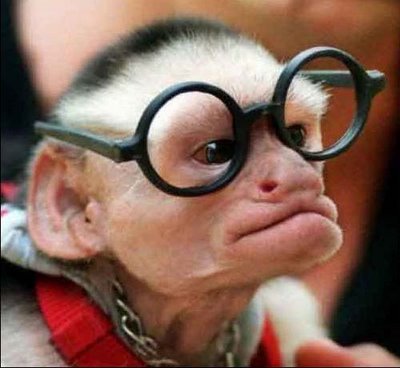My point is: three cheers for education!
Warning: As I get back into school, this blog will probably morph into something that is, well, boring. We all have something to say, but none of us are obligated to listen. The great thing about blogs is that I don’t know if five people or five thousand people are holding their heads and weeping at the beauty of my verbal catharsis.
Here's a shout out to Russell for being the only person who responded to the post on animal consciousness. I guess the rest of my faithful, growing readership (all five ... I mean four of you) simply doesn't care what goes through a puppy's head when it is starving to death in some crack addict's basement. Oh well, we all have our priorities.
I suppose I'll say a few things in response to Russell. I’m grateful that Russ caught the unintentional ambiguity between (1) self-consciousness as a feeling of concern about how others perceive oneself and (2) self-consciousness as an awareness of oneself as a being distinct from other beings. I was referring to the second sense.
I suspect that many, perhaps a majority, believe that animals have self-consciousness. Russell agrees. He provides three anecdotes to support his position:
(1) The behavior of his dog, Terry, is nearly indistinguishable from the behavior of his son, Porter.
(2) A study on sheepdogs concluded that they have a capacity for memory that is roughly equivalent to that of a 3-4 year old child. For example, they can identify a fetch toy (from a pile of other toys) after having not seen it for a year.
(3) Terry (the dog) shows a sort of self-concern and/or self-preservation that is inconsistent with a lack of self-awareness.
Here are some short thoughts in response:
(1) I, too, have always thought that infants are more like animals than humans, and should be treated as such. We teach them “tricks” like walking on two legs and we condition them to repeat phrases (like a parrot). Who can deny that we speak to babies and puppies in exactly the same babble-language? And when they do something bad, we speak real English in harsh, repetitive bursts, as if they magically understand after the third repetition. Unfortunately, I think this point gives us no reason to think that either babies or dogs are self-aware.
(2) This is the best argument, in spite of the fact that memory can be characterized in ways that don’t require self-awareness. The ability to identify something like a chew-toy (regardless of how much time has passed) in the way that the sheepdog does it ends up playing an important role in this discussion.
(3) How is Terry’s self-preservation different from a thorn-bush’s self-preservation, or that of any number of toxic plants, for that matter? Those plants are the way they are because any of their potential ancestors who were palatable and nice on the stomach were eaten. The tough, poisonous plants were the ones who passed down their genetic information. Of course, someone can say the same thing about the behaviors of humans, but there is (we hope) an important difference between humans and plants, and that difference has something to do with self-awareness. What is it about Terry that makes him seem like he has that extra ingredient?

The crucial point of self-consciousness, I believe, isn’t so much the consciousness as it is the self. Consciousness is such a hard term to define that we find professional philosophers (i.e. David Chalmers) who are willing to say that thermometers are conscious. If we are going to be so broad, we might simply say that consciousness is a responsiveness to information in the environment (which, if I remember correctly, isn’t terribly far from what Chalmers says). A self-conscious thing would then be responding to information about its self. Again, we come up against an ambiguity: something that responds to itself could be as simple as a camcorder taping itself in a mirror, but something that responds to its self must be in possession of some self to which it can respond. A camcorder doesn’t have a self. Why are we willing to say that?
Is there some activity or capacity—possessed by humans and lacking in camcorders—that is a necessary condition for selfhood?
I think there is, and I’m not sure that dogs have it. Before I taint you with my views (which are probably wrong anyway), I hope a few more people will share their thoughts.
Is there some activity or capacity—possessed by humans and lacking in camcorders—that is a necessary condition for selfhood?
I think there is, and I’m not sure that dogs have it. Before I taint you with my views (which are probably wrong anyway), I hope a few more people will share their thoughts.





